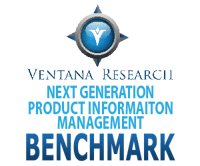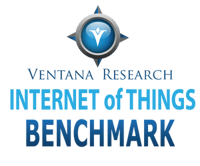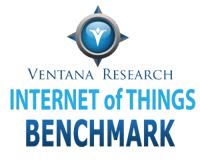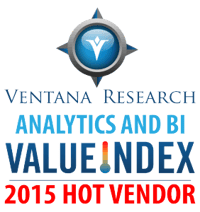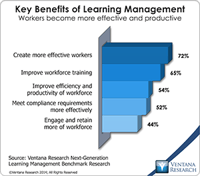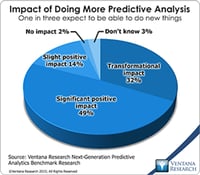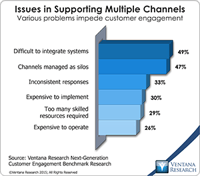The annual Ventana Research Digital Innovation Awards showcases advances in the productivity and potential of business applications, as well as technology that contributes significantly to improved efficiency and productivity in the processes and the performance of an organization. Our goal is to recognize technology and vendors that have introduced noteworthy digital innovations that advance business and IT.
Read More
Topics:
Analytics,
Collaboration,
Data Governance,
Data Lake,
Data Preparation,
Internet of Things,
Data,
Information Management (IM),
Digital Technology,
blockchain,
Conversational Computing,
collaborative computing,
mobile computing,
extended reality,
AI & Machine Learning
Having effective analytics enables businesses to understand far better than ever before the data they’re collecting, and to do so in greater volumes and more forms. These new capabilities are especially relevant to sales organizations. When applied to sales data, analytics can help sales teams achieve quotas and forecast more consistently, as well as understand the impacts of incentives and maximize the potential of territories, all of which help improve sales performance. These benefits...
Read More
Topics:
Customer Experience,
Voice of the Customer,
embedded analytics,
Analytics,
Business Intelligence,
Collaboration,
Data Governance,
Data Preparation,
Internet of Things,
Contact Center,
Data,
Information Management (IM),
Digital Technology,
Digital Commerce,
blockchain,
natural language processing,
data lakes,
Intelligent CX,
Subscription Management,
agent management,
AI & Machine Learning
Organizations in all industries face various difficulties in managing product information. The most serious is providing complete, engaging information to consumers and customers on the internet. Newly developed products, mergers and acquisitions, changes to pricing and promotions in online commerce spur business growth, but these factors also increase the amount and complexity of product-related data and content. In addition the digital economy offers a new generation of services that are sold...
Read More
Topics:
Big Data,
Operational Performance Management (OPM),
PIM, Product Information Management, Sales, Market,
Business Analytics,
Cloud Computing,
Uncategorized,
Business Performance Management (BPM),
Customer Performance Management (CPM),
Financial Performance Management (FPM),
Information Management (IM),
Information Optimization,
Sales Performance Management (SPM),
Supply Chain Performance Management (SCPM)
Organizations are facing a digital transformation, as I have written, that is rapidly changing the applications and services that businesses use to operate and deliver information. This new digital generation addresses the expectations of consumers and business partners for information and service in real time. One example of it is enterprise messaging. Recently I wrote about the shift to this technology and the challenges it poses for organizations that lack sufficient skills. However, new...
Read More
Topics:
Big Data,
Social Media,
Enterprise messaging, Internet of Things, IoT, mid,
Operational Performance Management (OPM),
Business Analytics,
Business Collaboration,
Cloud Computing,
Governance, Risk & Compliance (GRC),
Uncategorized,
Business Performance Management (BPM),
Customer Performance Management (CPM),
Financial Performance Management (FPM),
Information Management (IM),
Sales Performance Management (SPM),
Supply Chain Performance Management (SCPM)
Enterprise messaging is the technology backbone of communications for applications and systems within and between organizations. Both its importance and its complexity are growing as organizations increasingly have to provide real-time responses to business customers and consumers as well as their own business professionals who support them and their internal supply chains. The variety of use cases for enterprise messaging also is growing rapidly, expanding to the Internet of Things (IoT)...
Read More
Topics:
Big Data,
Social Media,
Enterprise messaging, Internet of Things, IoT, mid,
Operational Performance Management (OPM),
Cloud Computing,
Governance, Risk & Compliance (GRC),
Operational Intelligence,
Uncategorized,
Business Performance Management (BPM),
Customer Performance Management (CPM),
Information Management (IM),
Information Optimization,
Supply Chain Performance Management (SCPM)
At the 2015 technology analyst summit in Austin, Texas, analytics and business intelligence software vendor Qlik discussed recent market and product developments and explained its roadmap and strategy for 2016. Discussion topics included its Qlik Analytics Platform and QlikView 12.0, Qlik Sense and Qlik DataMarket, applications built on the platform but also how it is expanding its analytics experience for business.
Read More
Topics:
Big Data,
Business Analytics,
Business Intelligence,
Governance, Risk & Compliance (GRC),
Operational Intelligence,
Uncategorized,
Business Performance Management (BPM),
Information Management (IM),
Information Optimization
Businesses and their human resource organizations feel pressure to maximize the value of their human capital in today’s intensely competitive world. Many have made or considered investments in new applications that better exploit information to efficiently recruit, engage and retain the best talent. Advanced applications not only advance these processes but also help management assess the performance of the workforce and compensate individuals fairly so that they advance their careers and find...
Read More
Topics:
Big Data,
Predictive Analytics,
HCM, HR, HRMS, Workforce Management, Learning Mana,
Human Capital,
Business Analytics,
Business Collaboration,
Cloud Computing,
Governance, Risk & Compliance (GRC),
Uncategorized,
Business Performance Management (BPM),
Customer Performance Management (CPM),
Financial Performance Management (FPM),
Information Management (IM)
Technology innovation is accelerating faster than companies can keep up with. Many feel pressure to adopt new strategies that technology makes possible and find the resources required for necessary investments. In 2015 our research and analysis revealed many organizations upgrading key business applications to operate in the cloud and some enabling access to information for employees through mobile devices. Despite these steps, we find significant levels of digital disruption impacting every...
Read More
Topics:
Big Data,
Predictive Analytics,
Social Media,
Human Capital,
Operational Performance Management (OPM),
Analytics,
Business Analytics,
Business Collaboration,
Business Intelligence,
Cloud Computing,
Governance, Risk & Compliance (GRC),
Location Intelligence,
Operational Intelligence,
Uncategorized,
Business Performance Management (BPM),
Customer Performance Management (CPM),
Financial Performance Management (FPM),
Information Applications (IA),
Information Management (IM),
Sales Performance Management (SPM),
Supply Chain Performance Management (SCPM)
Stibo Systems has been providing product information management (PIM) software for decades. Its work has helped many organizations worldwide take control of their product information by developing a master definition that can be published acrossmany channels from Web to digital to print. We recognized its work with customers Delta Faucet and Masco Corp. in our 2015 Ventana Research Leadership Award in Information Management. In 2014 Stibo Systems customer Brady Corp. won a similar award for...
Read More
Topics:
Big Data,
Master Data Management,
MDM,
Operational Performance Management (OPM),
PIM,
Stibo Systems,
Cloud Computing,
Business Performance Management (BPM),
Customer Performance Management (CPM),
Financial Performance Management (FPM),
Information Management (IM),
Information Optimization,
Product Information Management,
Sales Performance Management (SPM),
Supply Chain Performance Management (SCPM)
This has been a dramatic year for Informatica, a major provider of data integration software. In August it was acquired and taken private by Permira funds and Canada Pension Plan Investment Board for about US$5.3 billion. This change was accompanied by shifts in its management. CEO Sohaib Abbasi became chairman and now has left, and many executives were replaced while Anil Chakravathy became CEO from being the Chief Product Officer. The new owners appear to have shifted the company’s strategic...
Read More
Topics:
Big Data,
Data Quality,
Master Data Management,
MDM,
Operational Performance Management (OPM),
Cloud Computing,
Data Integration,
Data Management,
Data Preparation,
Governance, Risk & Compliance (GRC),
Informatica,
Uncategorized,
Business Performance Management (BPM),
Information Management (IM),
Information Optimization,
Risk & Compliance (GRC)




